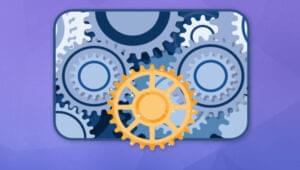Key Takeaways
The Rise of Artificial Intelligence (AI)
AI is taking the world by storm. From the amazing work of OpenAI with ChatGPT, to the technological advancements of Boston Dynamics, artificial intelligence is revolutionizing numerous industries, including software development. AI coding assistants have emerged as powerful tools, transforming the way developers write code, debug applications, and explore new possibilities. AI coding assistants are software tools that use AI techniques to assist developers in various aspects of the coding process. They’re designed to augment developers’ capabilities, increase productivity, and improve the overall coding experienceGitHub Copilot
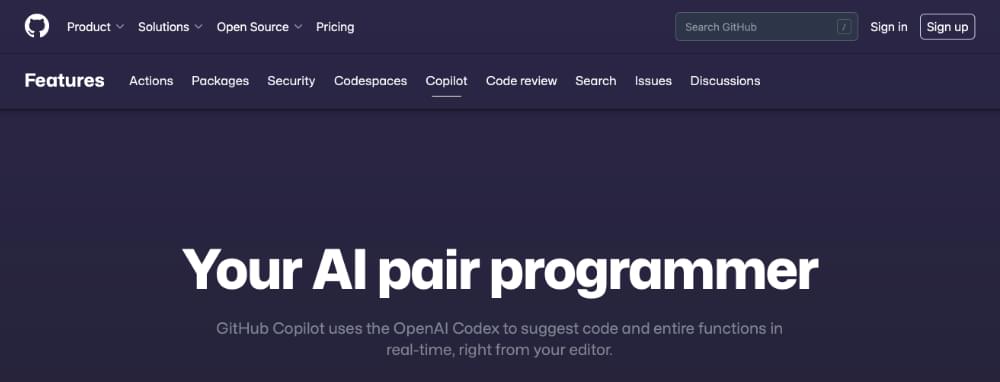 By far the most popular AI coding assistant in the game, GitHub Copilot is an AI-powered coding assistant developed by GitHub in collaboration with OpenAI. GitHub Copilot leverages OpenAI’s GPT (Generative Pre-trained Transformer) model, which has been trained on a vast amount of publicly available code.
By analyzing the context and patterns in the code being written, Copilot generates suggestions for completing code snippets, including entire lines, functions, or even multiple lines of code. To learn more about how Copilot works, check out What is GitHub Copilot? An AI Pair Programmer for Everyone.
By far the most popular AI coding assistant in the game, GitHub Copilot is an AI-powered coding assistant developed by GitHub in collaboration with OpenAI. GitHub Copilot leverages OpenAI’s GPT (Generative Pre-trained Transformer) model, which has been trained on a vast amount of publicly available code.
By analyzing the context and patterns in the code being written, Copilot generates suggestions for completing code snippets, including entire lines, functions, or even multiple lines of code. To learn more about how Copilot works, check out What is GitHub Copilot? An AI Pair Programmer for Everyone.
Copilot Pricing
GitHub Copilot is free to use for verified students, teachers, and maintainers of popular open-source projects. However, if you don’t fit into any of these categories, you’ll have to pay a monthly fee of $10.Copilot Pros
- Enhanced productivity. GitHub Copilot can significantly speed up the coding process by providing auto-generated code suggestions, saving you time and effort by completing repetitive or boilerplate code segments quickly.
- Improved code quality. Copilot provides suggestions based on best practices, established coding patterns, and code from reputable open-source projects. This helps improve code quality and reduce the likelihood of introducing errors or vulnerabilities.
- Language support. Copilot supports multiple programming languages, making it useful for developers working with different stacks. It can generate code snippets in languages such as Python, JavaScript, TypeScript, Ruby, and more.
Copilot Cons
- Dependency on existing code. Copilot relies on existing code available on public repositories to generate suggestions. This can lead to potential issues if the underlying code contains bugs, security vulnerabilities, or licensing conflicts.
- Lack of customization. Copilot currently doesn’t provide extensive customization options. While it allows users to provide hints or prompt it to generate specific code patterns, developers have limited control over its behavior and suggestions.
Ideal use cases for Copilot
- Debugging and troubleshooting. Copilot is most helpful during the debugging process, because it suggests potential fixes for common coding errors while offering insights into best practices.
- Prototyping and rapid development. When prototyping or working on quick iterations, Copilot is the best assistant to use, because it provides suggestions for common implementation patterns or best practices.
- Learning and exploring new technologies. Copilot is also ideally used when exploring new programming languages or frameworks.
Tabnine
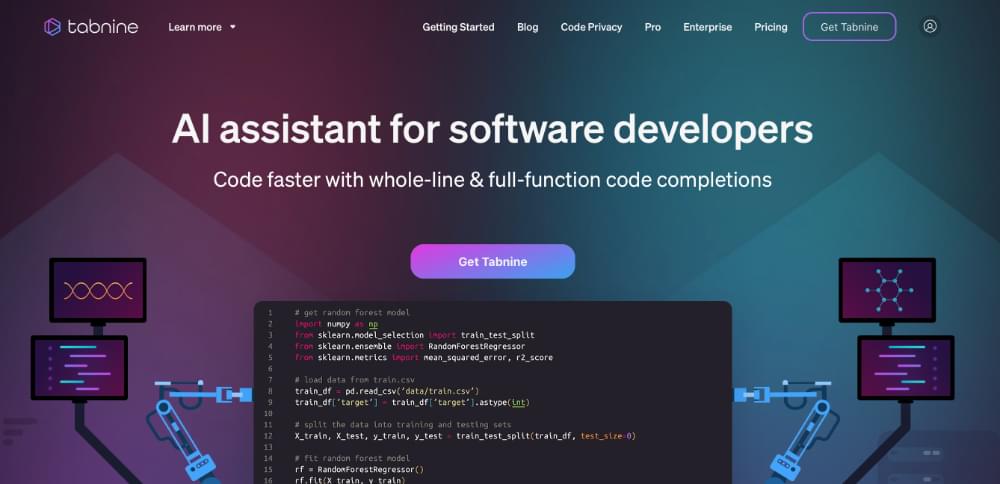 The next tool on our list is Tabnine, an AI-powered, code-completion tool that’s popular among developers. It uses deep learning algorithms to analyze code and provide intelligent suggestions for completing code snippets, and it also supports multiple programming languages. This versatility has made it a valuable tool for developers working on diverse projects and using different languages.
The best selling point for Tabnine, though, is that it’s focused on privacy. Tabnine allows you to train its AI model on your private code, meaning you can choose which code the models should be trained on, and organizations can connect the AI models to different repos for different teams.
The next tool on our list is Tabnine, an AI-powered, code-completion tool that’s popular among developers. It uses deep learning algorithms to analyze code and provide intelligent suggestions for completing code snippets, and it also supports multiple programming languages. This versatility has made it a valuable tool for developers working on diverse projects and using different languages.
The best selling point for Tabnine, though, is that it’s focused on privacy. Tabnine allows you to train its AI model on your private code, meaning you can choose which code the models should be trained on, and organizations can connect the AI models to different repos for different teams.
Tabnine Pricing
Tabnine has a free plan that enables short code completion, but a lot of its features are locked behind a $12/month paywall.Tabnine Pros
- Intelligent suggestions. Tabnine leverages deep learning algorithms to offer highly accurate and context-aware code suggestions. It can predict the next code element based on the existing code context, saving developers time and effort.
- Fast and responsive. Tabnine is known for its speed and responsiveness. It offers real-time suggestions, providing developers with instant feedback and reducing the waiting time for code completion.
- Cross-platform compatibility. Tabnine is compatible with various code editors and IDEs, such as Visual Studio Code, IntelliJ IDEA, PyCharm, and more. This cross-platform support makes it accessible to developers using different development environments.
- Language support. Tabnine supports a wide range of programming languages, including popular ones like Python, JavaScript, Java, C++, and many more. This makes it useful for developers working with diverse tech stacks.
Tabnine Cons
- Dependency on external factors. Tabnine relies on an internet connection to access its deep learning models and make accurate suggestions. In cases of slow or no internet connectivity, its performance may be affected.
- Complex code scenarios. Tabnine may struggle with suggesting accurate code in complex scenarios that require deep understanding of specific frameworks, libraries, or domain-specific knowledge. In such cases, the suggestions may be less reliable or relevant.
- Privacy concerns. As an AI-powered tool, Tabnine analyzes the code you write to generate suggestions. This raises privacy concerns for developers who may be working with sensitive or proprietary code. However, Tabnine offers a local-mode option to address this, performing code analysis locally without sending it to external servers.
Ideal use cases for Tabnine
- Writing complex or repetitive code. Tabnine is best used when dealing with complex logic or repetitive code patterns, because it can generate code for intricate algorithms, boilerplate code, or complex data structures.
Codeium
 Codeium is a relatively new AI coding assistant, but it still pulls its weight as one of the very best in the business. Codeium supports 70+ programming languages, and reduces boilerplate coding by scanning your code and writing the repetitive work so that you can stay in the coding flow state and be more productive.
Codeium has a natural-language-based search which, when combined with its codebase-aware chat, presents an incredibly powerful tool for developers. It has more latency than Copilot, and most importantly provides unit-test generation that can save a developer countless hours of work.
Codeium is a relatively new AI coding assistant, but it still pulls its weight as one of the very best in the business. Codeium supports 70+ programming languages, and reduces boilerplate coding by scanning your code and writing the repetitive work so that you can stay in the coding flow state and be more productive.
Codeium has a natural-language-based search which, when combined with its codebase-aware chat, presents an incredibly powerful tool for developers. It has more latency than Copilot, and most importantly provides unit-test generation that can save a developer countless hours of work.
Codeium Pricing
Codeium is free for individuals, but companies and teams have to pay for its enterprise offering. The enterprise version is priced on a per-seat basis (rather than just the number of users at any time).Codeium Pros
- Open source. As an open-source project, Codeium benefits from a collaborative community of developers as well as increased accessibility.
- Privacy-focused. Because Codeium is self-hosted, it ensures that no data related to the customer’s codebase or usage is transmitted to Codeium’s servers or any external locations outside of the customer’s own environment.
- Customizability. Codeium’s customization options are vast, which allows it to provide a wide range of extensions and customization options that you can have extensive control over. This gives you the ability to fine-tune its suggestions to your specific preferences.
Codeium Cons
- Updates and fixes. Since it’s a community-driven project, it may not receive updates or bug fixes as frequently as other popular code editors.
- Extensions. Some popular VS Code extensions may not work with Codeium, as it’s a separate project with some differences in its codebase.
- Native telemetry. Codeium itself doesn’t include any telemetry features, although some third-party extensions may include them.
Ideal use cases for Codeium
- Productivity and efficiency. Codeium aims to improve developer productivity and efficiency by reducing the time spent on repetitive tasks, automating code generation, and offering intelligent code completions. So if you need to code fast, Codeium should be your go-to.
- Exploring APIs and libraries. Codeium can assist developers in navigating through unfamiliar APIs or libraries by providing suggestions based on the context. It’s best used when trying to understand how to use specific functions or classes correctly.
CodeGeeX
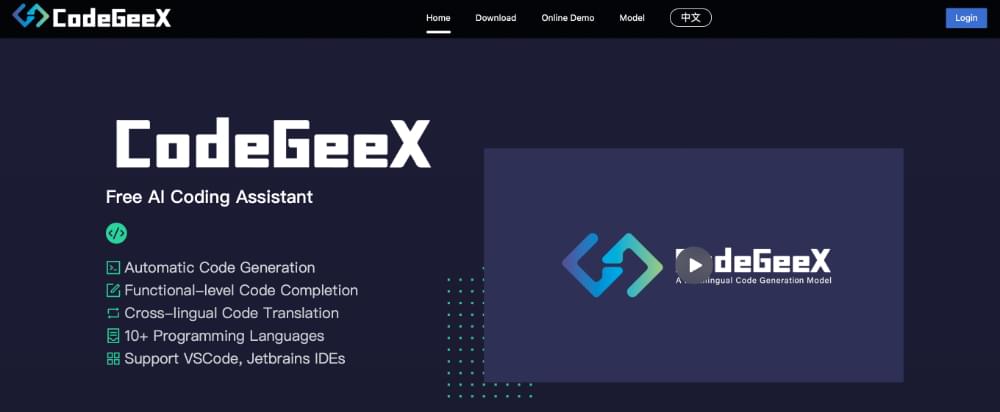 CodeGeeX is a large-scale, multilingual AI coding assistant that’s pre-trained on a large body of code from more than 30 programming languages. Trained on a cluster of Ascend 910 AI processors (arguably the world’s most powerful AI processor), CodeGeeX’s AI was designed with only one function in mind: making developers code more in less time.
CodeGeeX has four modes: stealth, prompt, interactive, and translation. The most impressive mode out of all four is the translation mode — in which CodeGeeX takes your code and translates it into any language of your choice. This means that you can copy someone’s code in JavaScript and translate it into C# if you want, or vice versa. If you’d like a more in-depth exploration of CodeGeeX, you can read about it here.
CodeGeeX is a large-scale, multilingual AI coding assistant that’s pre-trained on a large body of code from more than 30 programming languages. Trained on a cluster of Ascend 910 AI processors (arguably the world’s most powerful AI processor), CodeGeeX’s AI was designed with only one function in mind: making developers code more in less time.
CodeGeeX has four modes: stealth, prompt, interactive, and translation. The most impressive mode out of all four is the translation mode — in which CodeGeeX takes your code and translates it into any language of your choice. This means that you can copy someone’s code in JavaScript and translate it into C# if you want, or vice versa. If you’d like a more in-depth exploration of CodeGeeX, you can read about it here.
CodeGeeX Pricing
CodeGeeX is free and available as a VS Code extension, so you can simply go to the extension marketplace and install it.CodeGeeX Pros
- Language support. CodeGeeX supports 30+ languages, including popular ones like Python, JavaScript, Java, C++, and many more.
- Translation mode. CodeGeeX allows you easily translate your code from one language to another while inside your working environment.
- Enhanced productivity. CodeGeeX provides intelligent code completion suggestions based on patterns and practices learned from open-source projects. This can significantly speed up coding by reducing manual typing and eliminating the need to search for code examples.
CodeGeeX Cons
- Small userbase: CodeGeeX, in comparison with CoPilot and other widely-used AI-powered, code-generating tools, has a smaller user base. This results in bugs taking relatively longer to be fixed, given that it’s an open-source project.
Ideal use cases for CodeGeeX
- Code completion. CodeGeeX excels at providing accurate and context-aware code completions. It can help developers by suggesting code snippets, functions, variables, and entire lines of code based on the current context. It’s best used when starting a new project.
Visual Studio IntelliCode
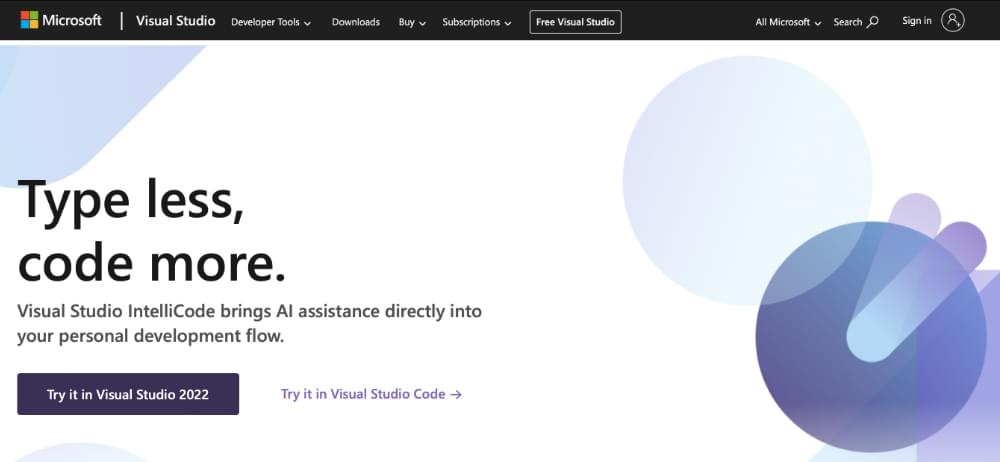 Visual Studio IntelliCode is an AI-powered coding assistant developed by Microsoft. It utilizes machine learning algorithms to analyze patterns and best practices from a wide range of code repositories, including open-source projects on GitHub. By learning from this vast codebase, IntelliCode can offer contextually relevant suggestions to developers as they write code, saving time and reducing errors.
IntelliCode is designed to recognize common coding tasks. Because of this, it can recommend the right quick action, and even complete it while you’re typing. With multilingual support, customization, and context aware recommendations, CodeGeeX is designed to enhance the productivity and efficiency of developers.
Visual Studio IntelliCode is an AI-powered coding assistant developed by Microsoft. It utilizes machine learning algorithms to analyze patterns and best practices from a wide range of code repositories, including open-source projects on GitHub. By learning from this vast codebase, IntelliCode can offer contextually relevant suggestions to developers as they write code, saving time and reducing errors.
IntelliCode is designed to recognize common coding tasks. Because of this, it can recommend the right quick action, and even complete it while you’re typing. With multilingual support, customization, and context aware recommendations, CodeGeeX is designed to enhance the productivity and efficiency of developers.
IntelliCode Pricing
Visual Studio IntelliCode is free and comes with a substantial free tier. Microsoft may start to charge for some IntelliCode features in the future, but the core functionality will remain free.IntelliCode Pros
- Customization options. IntelliCode allows developers to customize the suggestions. It can learn from a user’s codebase and adapt to their coding style, making the suggestions more personalized over time.
- Integration with Visual Studio. IntelliCode seamlessly integrates with Visual Studio, one of the most popular IDEs for software development. This integration provides a familiar and cohesive experience for developers, making it easy to adopt and use.
- Context-aware suggestions. IntelliCode understands the context of your code and can suggest relevant completions accordingly. It takes into account the current programming language, libraries, and frameworks being used, improving the accuracy and relevance of suggestions.
IntelliCode Cons
- Learning curve. While IntelliCode can improve productivity, there may be a learning curve to fully understand and utilize its capabilities. Developers need to familiarize themselves with the suggestions and learn how to leverage them effectively.
- Potential false positives or irrelevant suggestions. IntelliCode’s suggestions are based on learned patterns, which introduces the possibility of false positives or suggestions that may not be applicable in a specific context, so you need to carefully review and evaluate the suggestions before incorporating them into your code.
- Dependency on Microsoft ecosystem. IntelliCode is tightly integrated with Visual Studio, making it primarily suited for developers who use the Microsoft ecosystem. Developers using other IDEs or platforms may not have access to the same level of integration and functionality.
Ideal use cases for IntelliCode
- Refactoring assistance. IntelliCode can help with code refactoring tasks by suggesting appropriate refactorings based on the code context. It can offer suggestions for renaming variables, extracting methods, converting code to more efficient constructs, and other common refactoring operations, making it easier to improve code quality and maintainability.
- Code quality and best practices. IntelliCode can analyze your code and provide suggestions to improve code quality and adhere to best practices. It’s best used if you’re particularly worried about delivering industry-standard code.
Sourcery
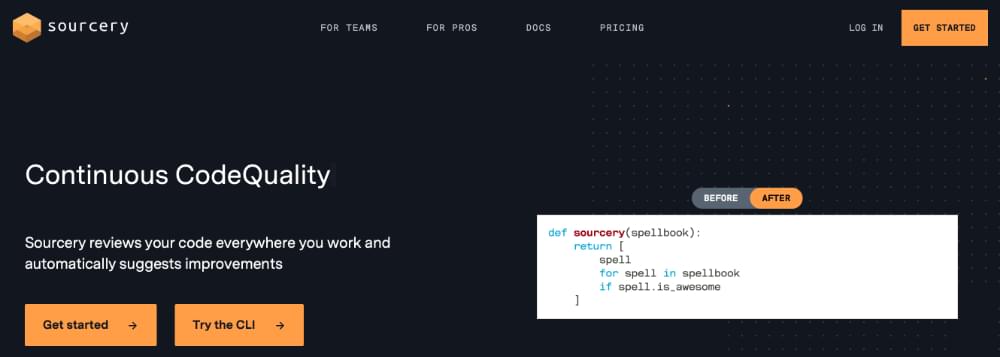 Sourcery is a coding assistant and refactoring tool specifically for Python and JavaScript. It aims to automate repetitive or tedious coding tasks and helps improve code quality. Sourcery analyzes code and provides suggestions for automated refactoring, code optimizations, and best practices. It suggests ways to improve code quality by identifying potential bugs and performance bottlenecks.
Sourcery aims to assist developers in improving code quality, reducing technical debt, and automating repetitive tasks. By leveraging automated refactoring and code analysis, Sourcery enhances the coding experience and promotes cleaner, more efficient codebases.
Sourcery is a coding assistant and refactoring tool specifically for Python and JavaScript. It aims to automate repetitive or tedious coding tasks and helps improve code quality. Sourcery analyzes code and provides suggestions for automated refactoring, code optimizations, and best practices. It suggests ways to improve code quality by identifying potential bugs and performance bottlenecks.
Sourcery aims to assist developers in improving code quality, reducing technical debt, and automating repetitive tasks. By leveraging automated refactoring and code analysis, Sourcery enhances the coding experience and promotes cleaner, more efficient codebases.
Sourcery Pricing
Sourcery has a free plan that individuals can use, but to get the best out of Sourcery you’ll have to pay $12/month for the pro package or $24/month for the teams package.Sourcery Pros
- Customizable templates. Sourcery allows developers to define their own code generation templates using custom rules and patterns. This provides flexibility and customization options to tailor the code generation process according to specific project requirements and coding standards.
- Code consistency. By using predefined templates and rules, Sourcery helps maintain code consistency across a codebase. It ensures that code is generated following established patterns and practices, reducing the chances of inconsistencies or errors introduced by manual coding.
- Integration with build processes. Sourcery can be seamlessly integrated into the build process, allowing for automatic code generation during the build phase. This ensures that the generated code is always up to date and reduces the need for manual intervention.
Sourcery Cons
- Complexity management. As code generation templates become more complex and customizable, managing and maintaining those templates can become challenging. It’s essential to maintain good documentation and organization to ensure templates remain understandable and maintainable.
- Language support. It’s only available for Python and JavaScript, so it may not be useful for developers working with other programming languages.
Ideal use cases for Sourcery
- Performance optimization. Sourcery assists in identifying potential performance bottlenecks and suggesting optimizations, so it’s best used for optimizing performance.
- Legacy code refactoring. Refactoring legacy code can be challenging due to its size, complexity, and lack of documentation. Sourcery shines here because it can help simplify the process by automatically identifying and applying refactorings that align with modern coding practices.
Conclusion
The six tools discussed above are the go-to AI coding assistants for developers in 2023. Using any one of them can improve your coding experience and extensively improve your productivity. And privacy isn’t a concern with these coding tools, as none of them send your data back to their parent companies. A word of warning, though: if you’re new to development and still learning, it’s best not to rely too heavily on coding assistants, as they may be counterproductive to your learning process!Frequently Asked Questions (FAQs) about AI Coding Assistants
What are the key benefits of using AI coding assistants?
AI coding assistants offer several benefits. They can significantly speed up the coding process by suggesting code snippets, detecting errors, and providing solutions in real-time. They can also help in learning new programming languages by providing instant feedback and suggestions. Moreover, they can automate repetitive tasks, freeing up developers to focus on more complex aspects of coding. AI coding assistants can also help in maintaining coding standards and best practices across a team, leading to more efficient and high-quality code.
How do AI coding assistants work?
AI coding assistants use machine learning algorithms to understand the context of the code being written. They analyze the code structure, syntax, and semantics to provide relevant suggestions. Some AI coding assistants also use natural language processing to understand the intent of the developer, allowing them to provide more accurate and context-specific suggestions.
Can AI coding assistants replace human developers?
While AI coding assistants can automate certain tasks and improve efficiency, they cannot replace human developers. Coding involves complex problem-solving and creative thinking, which AI currently cannot replicate. AI coding assistants are tools designed to assist developers, not replace them.
Are AI coding assistants reliable?
AI coding assistants are generally reliable for providing code suggestions and detecting errors. However, they are not infallible and should not be relied upon entirely. Developers should always review the suggestions provided by the AI and use their judgment to decide the best course of action.
Can AI coding assistants help in learning new programming languages?
Yes, AI coding assistants can be a valuable tool for learning new programming languages. They can provide instant feedback and suggestions, helping learners understand the syntax and semantics of the new language more quickly. However, they should be used as a supplement to traditional learning methods, not as a replacement.
What are some popular AI coding assistants?
Some popular AI coding assistants include Kite, Codota, Tabnine, and DeepCode. These tools offer a range of features such as real-time code suggestions, error detection, and automation of repetitive tasks.
How to choose the right AI coding assistant?
Choosing the right AI coding assistant depends on your specific needs and preferences. Consider factors such as the programming languages supported, integration with your preferred IDE, the accuracy of code suggestions, and the cost.
Can AI coding assistants help in collaborative coding projects?
Yes, AI coding assistants can help in maintaining coding standards and best practices across a team, leading to more efficient and high-quality code. They can also help in detecting and resolving conflicts in collaborative coding projects.
Are AI coding assistants expensive?
The cost of AI coding assistants varies depending on the features and services they offer. Some tools offer free versions with limited features, while others require a monthly or annual subscription. It’s important to evaluate the cost against the benefits and choose a tool that offers the best value for your needs.
Can AI coding assistants work offline?
Some AI coding assistants require an internet connection to function, as they rely on cloud-based machine learning models. However, others can work offline by downloading the necessary data and models to your local machine. Check the specifications of the tool to determine if it can work offline.
 Fimber Elemuwa
Fimber ElemuwaFimber is a freelance frontend developer, Unity dev and technical writer who writes about the best programming practices, and likes making hard concepts easier. He's currently studying Microbiology at the University of Port Harcourt.






